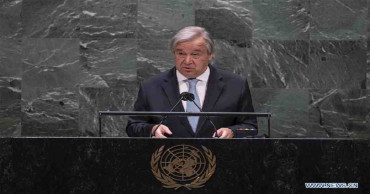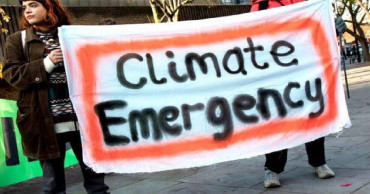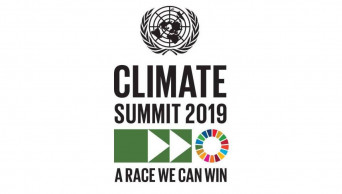climate emergency
UN forecasts fall in global economic growth to 1.9% in 2023
The United Nations forecast Wednesday (January 25, 2023) that global economic growth will fall significantly to 1.9% this year as a result of the food and energy crisis sparked by the war in Ukraine, the ongoing impact of the COVID-19 pandemic, persistently high inflation and the climate emergency.
Painting a gloomy and uncertain economic outlook, the U.N. Department of Economic and Social Affairs said the current global economic slowdown “cuts across both developed and developing countries, with many facing risks of recession in 2023.”
“A broad-based and severe slowdown of the global economy looms large amid high inflation, aggressive monetary tightening, and heightened uncertainties,” U.N. Secretary-General Antonio Guterres said in a foreword to the 178-page report.
The report said this year's 1.9% economic growth forecast — down from an estimated 3% in 2022 — is one of the lowest growth rates in recent decades. But it projects a moderate pick-up to 2.7% in 2024 if inflation gradually abates and economic headwinds start to subside.
Read More: Global economic growth will slow down in 2023, but will pick up in 2024: IMF chief
In its annual report earlier this month, the World Bank which lends money to poorer countries for development projects, cut its growth forecast nearly in half, from it previous projection of 3% to just 1.7%.
The International Monetary Fund, which provides loans to needy countries, projected in October that global growth would slow from 6% in 2021 to 3.2% in 2022 and 2.7% in 2023. IMF Managing Director Kristalina Georgieva said at last week’s World Economic Forum in Davos that 2023 will be a difficult year, but stuck by the projection and said “we don’t expect a global recession.”
Shantanu Mukherjee, director of the economic analysis and policy division of the U.N. Department of Economic and Social Affairs, highlighted the growing income inequality in the world at a news conference launching the report.
Between 2019 and 2021, he said, average incomes for the top 10% rose by 1.2% while the incomes of the lowest 40% fell by 0.5%.
Read More: Bangladesh-Turkiye Business Forum launched to usher in new era of economic cooperation
“The top 10% now earns on average over 42 times what the lowest percentiles” earn, Mukherjee said.
According to the U.N. report, this year “growth momentum has weakened in the United States, the European Union and other developed economies, adversely affecting the rest of the world economy.”
In the United States, GDP is projected to expand by only 0.4% in 2023 after estimated growth of 1.8% in 2022, the U.N. said. And many European countries are projected to experience “a mild recession" with the war in Ukraine heading into its second year on Feb. 14, high energy costs, and inflation and tighter financial conditions depressing household consumption and investment.
The economies in the 27-nation European Union are forecast to grow by just 0.2% in 2023, down from an estimated 3.3% in 2022, the U.N. said. And in the United Kingdom, which left the EU three years ago, GDP is projected to contract by 0.8% in 2023, continuing a recession that began in the second half of 2022, it said.
Read More: China’s economic growth falls to second-lowest level in four decades
With China’s government abandoning its zero-COVID policy late last year and easing monetary and fiscal policies, the U.N. forecast that its economy, which expanded by only 3% in 2022, will accelerate to 4.8% this year.
“But the reopening of the economy is expected to be bumpy,” the U.N. said. ”Growth will likely remain well below the pre-pandemic rate of 6-6.5%.”
The U.N. report said Japan’s economy is expected to be among the better-performing among developed countries this year, with GDP forecast to increase by 1.5%, slightly lower than last year’s estimated growth of 1.6%.
Across east Asia, the U.N. said economic recovery remains fragile though GDP growth in 2023 is forecast to reach 4.4%, up from 3.2% last year, and stronger than in other regions.
Read More: AL govt's ouster a 'must' to tackle political, economic crises
In South Asia, the U.N. forecast average GDP growth will slow from 5.6% last year to 4.8% this year as a result of high food and energy prices, “monetary tightening and fiscal vulnerabilities.”
But growth in India, which is expected to overtake China this year as the world’s most populous nation, is expected to remain strong at 5.8%, slightly lower than the estimated 6.4% in 2022, “as higher interest rates and a global slowdown weigh on investments and exports,” the U.N. report said.
In Western Asia, oil-producing countries are benefiting from high prices and rising output as well as a revival in tourism, the U.N. said. But economies that aren’t oil producers remain weak “given tightening access to international finance and severe fiscal constraints,” and average growth in the region is projected to slow from an estimated 6.4% in 2022 to 3.5% this year.
The U.N. said Africa has been hit “by multiple shocks, including weaker demand from key trading partners (especially China and Europe), a sharp increase in energy and food prices, rapidly rising borrowing costs and adverse weather events.”
Read More: Burden of Bangladesh’s economic and political stability must be shared
One result, it said, is mounting debt-servicing burdens which have forced a growing number of African governments to seek bilateral and multilateral support.
The U.N. projected economic growth in Africa to slow from an estimated 4.1% in 2022 to 3.8% this year.
In Latin America and the Caribbean, the U.N. said the outlook “remains challenging,” citing labor market prospects, stubbornly high inflation and other issues. It forecast that regional growth will slow to just 1.4% in 2023 from an estimated expansion of 3.8% in 2022.
“The region’s largest economies – Argentina, Brazil and Mexico – are expected to grow at very low rates due to tightening financial conditions, weakening exports, and domestic vulnerabilities,” the U.N. said.
Read More: Bangladesh considering ‘pros and cons’ of Indo-Pacific Economic Framework: Momen
For the world’s least developed countries, the U.N. said growth is projected at 4.4% this year, about the same as last year but significantly below the UN's target of 7% by 2030.
3 years ago
“Put People Over Profit”: Bangladeshi youths join Global Climate Strike
Global Climate Strike 2022 was observed in Bangladesh with hundreds of young people turning out in front of Jatiya Press Club in Dhaka today.
ActionAid Bangladesh, with 72 countries, organized the Climate Strike in collaboration with Fridays for Future and youth groups.
The goal of the climate strike is to urge all nations to act immediately in support of climate justice — by sending a loud, yet nonviolent statement, according to a press release.
Read: PM to focus on peace & climate change in her UNGA speech: Momen
The youngsters demanded that the government declare a ‘Climate Emergency’ and that world leaders prioritize ‘people not profit’.
3 years ago
Climate emergency demands policy shift to adaptation: Global leaders on COP26
Global leaders gathered in Rotterdam to participate in the Global Center on Adaptation (GCA) high-level dialogue have said the climate emergency demands policy shift to adaptation
The dialogue titled “An Adaptation Acceleration Imperative for COP26” held in Rotterdam, Netherlands on Monday.
Foreign Minister Dr AK Abdul Momen represented Bangladesh in the dialogue.
With less than a hundred days to go until the world’s most significant summit on climate change, the dialogue established that the success of COP26 will be determined by whether, for the first time, climate adaptation is elevated to an equal priority with the mitigation of carbon emissions.
Patrick Verkooijen, the CEO of the Global Center on Adaptation, who convened the dialogue, said they are now living in the eye of the storm – ‘adapting the world to our climate emergency is essential for our safety even as we tackle a global pandemic’.
"From now on, we’re fighting a battle on two fronts: we have to fight to slash emissions while investing the same level of energy to adapt to a global climate emergency. Millions of lives and the safety of communities around the world are already at stake.”
Read:UK Foreign Secretary reaffirms support for Bangladesh’s climate actions
Over 50 leaders from the international climate and development community attended the dialogue which concluded with a communique adopted in the presence of the dialogue’s co-conveners, chair of the Board, 8th Secretary-General Ban Ki-moon, CEO of the Global Center on Adaptation, Patrick Verkooijen, managing director of the International Monetary Fund, Kristalina Georgieva and UN High-Level Climate Champion on Private Sector for COP26, Feike Sijbesma.
The recent report from the IPCC warned a major worsening of climate impacts is coming a decade earlier than previously anticipated with unprecedented and irreversible changes.
It highlighted that certain impacts, such as extreme heat spells, would double in scale over the next decade, demanding unprecedented acceleration and investment in adaptation and resilience to counteract the growing climate emergency.
“We should be very clear that there is no issue with the Paris Agreement itself. It has been exactly the framework we needed, if only it could be lived up to. What we need to do is rebuild confidence and trust to work together under the Paris regime," said Ban Ki-moon, 8th Secretary-General of the United Nations and Chair of the Global Center on Adaptation.
He said countries are ready for new ambition on adaptation, and they are ready for much scaled up financing for adaptation too. "For this, solutions already out there need to be shared and put into place.”
Ban Ki-moon noted that the Africa Adaptation Acceleration Program (AAAP), created by GCA in partnership with the African Development Bank and backed by the African Union, serves as a template for the ambition and approach that needs to be scaled across all regions of the world.
President of the Democratic Republic of Congo and Chair of the African Union, Felix-Antoine Tshisekedi said at the peak of the corona pandemic, there was a collective political will, by all countries, to address the crisis.
He also announced that, under the auspices of the African Union, he will chair a Leaders Event for friends of Africa’s adaptation during COP26.
4 years ago
Carbon neutrality by 2050: The world's most urgent mission
As the world marks the fifth anniversary of the adoption of the landmark Paris Agreement on climate change, a promising movement for carbon neutrality is taking shape. By next month, countries representing more than 65 per cent of harmful greenhouse gasses and more than 70 per cent of the world economy will have committed to achieve net zero emissions by the middle of the century.
5 years ago
New Zealand symbolically declares climate emergency
Joining more than 30 countries, New Zealand on Wednesday took the symbolic step of declaring a climate emergency.
5 years ago
Int'l cooperation only way to defeat COVID-19, climate emergency: UN chief
United Nations Secretary-General Antonio Guterres said on Monday that international cooperation is the only way to defeat the COVID-19 pandemic and the climate emergency, reports Xinhua.
5 years ago
Climate emergency ‘a danger to peace’: UN official
The climate emergency generated by global warming, is exacerbating existing risks to international peace and security and also creating new ones, a senior UN official told the Security Council on Friday, making the case for swift climate action on multiple fronts.
5 years ago
"Climate emergency" becomes word of year for 2019: Oxford Dictionaries
Oxford Dictionaries, part of Oxford University Press, has declared "climate emergency" the word of the year for 2019.
6 years ago
Youth leaders call for urgent action to address climate emergency
Dhaka, Sept 22 (UNB) – Amid global march of the young people demanding urgent climate action, the youth leaders brought their message to the UN for the Youth Climate Summit, the opening salvo of the three-day long United Nations Climate Action Summit, which will culminate on Monday.
6 years ago



.jpg)
.jpg)

.jpg)






